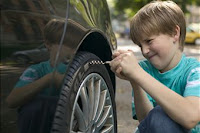Isolation in Teens with Asperger’s and HFA: Parents’ Comments
Parents’ comments based on this article ==> Isolation in Teens with Asperger’s and HFA: Antisocial Behavior or Self-Preservation? Below are parents’ comments regarding teens with Asperger’s and High-Functioning Autism and their tendency to isolate (see article link above). Is their isolation a form of antisocial behavior or simply a method of self-preservation? • Anonymous said… A lot of people, neutotypical or otherwise, are introverted and actually need time to be alone and relax and recoup energy, whereas extroverted people need more time with other people to get energized. High school is stressful enough without extra-curricular activities, especially for introverts. Kids don't need to have every minute of every day planned out for them. Doing so creates adults who can't function when they are alone because they need someone or something to constantly entertain them. Some activities are good if they provide fun and joy, but you have to be aware that adding more

